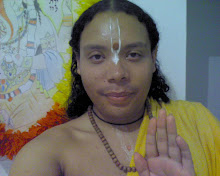


Om Jai Jagdish Hare
By Pandit Shardha Ram Phillauri
Translated by P. R. Ramachander
[This is one of the very popular prayers in Hindi sung by all Hindus. It is written in a colloquial dialect of Hindi and touches the heart instantly. This translation is slightly different from what is available in the web. I have tried to translate the words and also tried to have a similar poetic format, so that it can be sung.]
Swami Jai Jagdish hare
Bhakt jano ke sankat
Das jano ke sankat
Shan men door kare
Om jai Jagdish hare. 1
Victory to Vishnu, the lord of the universe
Who will remove in a second,
The sorrow of all his devotees,
And the sorrows of all his followers.
Om victory to Vishnu, the Lord of Universe
Jo dhyave phal pave
Dukh bin se man ka
Swami dukh bin se man ka
Sukh sampati ghar ave
Swami, Sukh sampati ghar ave
Kasht mite tan ka
Om jai Jagdish hare. 2
He who meditates will get the fruit,
Of a mind without sorrows,
Lord, mind without sorrows,
Pleasures and wealth will come to his house,
Lord, Pleasures and wealth will come to his house,
And the sufferings of his body will be cured.
Om Victory to Vishnu, the Lord of the universe.
Mata pita tum mere
Sharan Paoon main kiski
Swami sharan paoon main kiski
Tum bin aur na dooja
Prabhu bin aur na dooja
As karoon main jiski
Om jai Jagdish hare. 3
You are my father and mother,
To whom should I surrender,
Lord, to whom should I surrender?
Except you I do not see any one else,
Lord except you I do not see anyone else,
To whom I should surrender,
Om victory to Vishnu, the Lord of universe.
Tum pooran Paramatam
Tum Antaryami
Swami tum Antaryami
Par Brahm Parameshwar
Swami, Par Brahm Parameshwar
Tum sabke swami
Om jai Jagdish hare. 4
You are the complete eternal lord,
You are the one who resides in me,
Lord, you are the one who resides in me,
You are the greatest Lord who is the eternal truth,
Lord, who is the eternal truth,
And you are the lord of everyone.
Om victory to Vishnu, the Lord of the universe.
Tum karuna ke sagar
Tum palan karta
Swami tum palan karta
Main moorakh khal khami
Main sevak tum swami
Kripa karo Bharta
Om jai Jagdish hare. 5
You are the ocean of mercy,
You are the Lord who takes care of us all,
Lord, you are the one who takes care of us all,
I am a simpleton with wrong wishes,
And Lord, also your humble follower,
Shower your mercy on me, Oh lord.
Om victory to Vishnu, the Lord of the universe.
Tum ho ek agochar
Sab ke pran pati
Swami sab ke pran pati
Kis vidhi miloon Gosai
Kis vidhi miloon Dayalu
Tum ko main kumati
Om jai Jagdish hare. 6
You are the one who is beyond my sight,
You are the lord of soul of everyone,
Lord, you are the lord of soul of everyone,
What rules should I follow sage?
What rules should I follow, merciful one?
In worshipping you, this foolish one.
Om victory to Vishnu, the Lord of the universe.
Deen bandhu dukh harta
Thakur tum mere
Swami Thakur tum mere
Apne hath uthao
Apni sharani lagao
Dwar paoa hoon tere
Om jai Jagdish hare. 7
You are the relation of the oppressed,
You are the one who removes all sorrows,
Lord you are my leader,
Please lift your hand,
Then bless me,
As I have reached the gate of yours.
Om victory to Vishnu, the Lord of the universe.
Vishay vikar mitavo
Pap haro Deva
Swami pap haro Deva
Shradha bhakti baohao
Swami, Shradha bhakti baohao
Santan ki seva
Om jai Jagdish hare. 8
Remove emotions in case of all issues from me,
Oh Lord, who destroys all sins,
Lord, who destroys all sins,
You increase my devotion and attachment to you,
Lord, increase my devotion and attachment,
And make me serve you who does not have an end.
Om victory to Vishnu, the Lord of the universe.
Om jai Jagdish hare
Swami jai Jagdish hare
Bhakt jano ke sankat
Das jano ke sankat
Shan men door kare
Om jai Jagdish hare. 9
Om victory to Vishnu, the Lord of the universe,
Lord, victory to Vishnu, the Lord of the universe,
The sorrows of your dear devotees,
The sorrows of your followers,
You, drive away far, far away in a second,
Om victory to Vishnu, the Lord of the universe.















